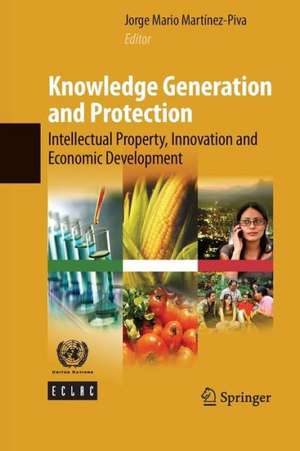Knowledge Generation and Protection: Intellectual Property, Innovation and Economic Development
Editat de Jorge Mario Martínez-Pivaen Limba Engleză Paperback – 11 sep 2014
| Toate formatele și edițiile | Preț | Express |
|---|---|---|
| Paperback (1) | 642.68 lei 6-8 săpt. | |
| Springer – 11 sep 2014 | 642.68 lei 6-8 săpt. | |
| Hardback (1) | 649.06 lei 6-8 săpt. | |
| Springer – 17 dec 2009 | 649.06 lei 6-8 săpt. |
Preț: 642.68 lei
Preț vechi: 756.09 lei
-15% Nou
Puncte Express: 964
Preț estimativ în valută:
122.98€ • 134.00$ • 103.63£
122.98€ • 134.00$ • 103.63£
Carte tipărită la comandă
Livrare economică 23 aprilie-07 mai
Preluare comenzi: 021 569.72.76
Specificații
ISBN-13: 9781489985156
ISBN-10: 1489985158
Pagini: 344
Ilustrații: XX, 321 p.
Dimensiuni: 155 x 235 x 18 mm
Greutate: 0.48 kg
Ediția:2010
Editura: Springer
Colecția Springer
Locul publicării:New York, NY, United States
ISBN-10: 1489985158
Pagini: 344
Ilustrații: XX, 321 p.
Dimensiuni: 155 x 235 x 18 mm
Greutate: 0.48 kg
Ediția:2010
Editura: Springer
Colecția Springer
Locul publicării:New York, NY, United States
Public țintă
ResearchCuprins
Intellectual Property Today: Appropriability, Innovation and Public Policy.- Intellectual Property and Development: An Interpretation of the (NEW) Markets for Knowledge.- Protection of Intellectual Property Rights, Innovation, and Development.- The Frontier of Trade Negotiations.- The Flexibility of TRIPS and Its Possible Erosion in Bilateral, Multilateral, and Regional Negotiations.- Intellectual Property and the New Generation of Free Trade Agreements: The Agreement Between Chile and the United States of America.- Free Trade Agreements and Intellectual Property: Impacts and Challenges.- Intellectual Property Rights in the Agenda of the Developing Countries.- Intellectual Property Rights in the Agenda of the Developing Countries. Intellectual Property Laws and Access to Medicines.- Intellectual Property Rights and Biological Diversity: Considerations for Latin America.- Intellectual Property in Living Organisms. Current Situation, Trends and Challenges.- Technological and Innovation Policy in Mexico.- Premises and Instruments of Innovation Policy: A Reflection from the Mexican Case.- Recent Changes in Science and Technology Policy in Mexico: Innovation Incentives.- Scientific and Technological Policy in Mexico and Intellectual Property.
Textul de pe ultima copertă
The wealth of the most developed nations, and, to a large extent their economic growth, can be explained by the capacities to generate research, create knowledge, appropriate it and transform it into new technologies. The study of the dynamics and contemporary mechanisms for the circulation, access, and commercial application of knowledge is an urgent task, since the capabilities related to technological change appear increasingly to be the path for developing countries to move away from their condition on the periphery.
Knowledge Generation and Protection, edited by Jorge Mario Martínez-Piva, and showcasing research from academics, policymakers, and consultants, offers an analysis of three fundamental topics. The first is whether strengthening protection of intellectual property encourages or hinders technological learning and innovation in the developing countries. The second addresses the way in which knowledge is generated and how it is transformed into useful technology for the market, that is, how national innovation systems work. The third is the role of public policy as an instrument for innovation and for regulating intellectual property. Chapters explore the relationships among intellectual property, innovation, economic development, and policy in depth, with particular attention to such emerging topics as the impact of trade agreements on intellectual property rights and sensitive issues for developing countries such as access to medicines, and protection of biological diversity, living organisms, and traditional knowledge. Several chapters focus on Mexico, which serves as an important example as the only developing nation that is a member of OECD and has a rich history of industrial policy, science and technology policy, and trade openness. The concluding chapter argues that if developing countries seek to develop dynamic competitiveness based on knowledge and innovation in the present context of rigorous intellectual propertyregulations, they should take a leap in their science and technology policies to take advantage of the growing world market and open up long-term development paths.
Knowledge Generation and Protection, edited by Jorge Mario Martínez-Piva, and showcasing research from academics, policymakers, and consultants, offers an analysis of three fundamental topics. The first is whether strengthening protection of intellectual property encourages or hinders technological learning and innovation in the developing countries. The second addresses the way in which knowledge is generated and how it is transformed into useful technology for the market, that is, how national innovation systems work. The third is the role of public policy as an instrument for innovation and for regulating intellectual property. Chapters explore the relationships among intellectual property, innovation, economic development, and policy in depth, with particular attention to such emerging topics as the impact of trade agreements on intellectual property rights and sensitive issues for developing countries such as access to medicines, and protection of biological diversity, living organisms, and traditional knowledge. Several chapters focus on Mexico, which serves as an important example as the only developing nation that is a member of OECD and has a rich history of industrial policy, science and technology policy, and trade openness. The concluding chapter argues that if developing countries seek to develop dynamic competitiveness based on knowledge and innovation in the present context of rigorous intellectual propertyregulations, they should take a leap in their science and technology policies to take advantage of the growing world market and open up long-term development paths.
Caracteristici
Explores the dynamic relations among intellectual property rights, international trade, innovation, economic development, and science and technology policy Covers such timely issues as access to medicines, and protection of biological diversity, living organisms, and traditional knowledge Applies in-depth analysis of Mexico to apply to developing countries, in general Sponsored by the Economic Commission for Latin America and the Caribbean (ECLAC) and featuring contributions from academics, policymakers, and consultants Includes supplementary material: sn.pub/extras

















